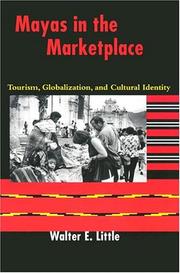| Listing 1 - 7 of 7 |
Sort by
|

ISBN: 0292705670 9780292705678 0292702787 9780292702783 Year: 2004 Publisher: Austin University of Texas Press
Abstract | Keywords | Export | Availability | Bookmark
 Loading...
Loading...Choose an application
- Reference Manager
- EndNote
- RefWorks (Direct export to RefWorks)
Selling handicrafts to tourists has brought the Maya peoples of Guatemala into the world market. Vendors from rural communities now offer their wares to more than 500,000 international tourists annually in the marketplaces of larger cities such as Antigua, Guatemala City, Panajachel, and Chichicastenango. Like businesspeople anywhere, Maya artisans analyze the desires and needs of their customers and shape their products to meet the demands of the market. But how has adapting to the global marketplace reciprocally shaped the identity and cultural practices of the Maya peoples? Drawing on over a decade of fieldwork, Walter Little presents the first ethnographic study of Maya handicraft vendors in the international marketplace. Focusing on Kaqchikel Mayas who commute to Antigua to sell their goods, he explores three significant issues: &sum how the tourist marketplace conflates global and local distinctions. &sum how the marketplace becomes a border zone where national and international, developed and underdeveloped, and indigenous and non-indigenous come together. &sum how marketing to tourists changes social roles, gender relationships, and ethnic identity in the vendors' home communities. Little's wide-ranging research challenges our current understanding of tourism's negative impact on indigenous communities. He demonstrates that the Maya are maintaining a specific, community-based sense of Maya identity, even as they commodify their culture for tourist consumption in the world market.
Cakchikel Indians --- Maya business enterprises --- Culture and tourism --- Tourists --- Antigua Region (Guatemala) --- Commerce --- Economic conditions --- Social conditions --- Attitudes --- Social conditions. --- Economic conditions.
Book
ISBN: 9780292759824 Year: 2021 Publisher: Austin
Abstract | Keywords | Export | Availability | Bookmark
 Loading...
Loading...Choose an application
- Reference Manager
- EndNote
- RefWorks (Direct export to RefWorks)
Book
ISBN: 9781793646309 1793646309 Year: 2021 Publisher: Lanham : Lexington Books,
Abstract | Keywords | Export | Availability | Bookmark
 Loading...
Loading...Choose an application
- Reference Manager
- EndNote
- RefWorks (Direct export to RefWorks)
"Based on in-depth ethnographic research, Norms and Illegality: Intimate Ethnographies and Political Control explores the entanglements and contradictions of legal and illegal practices across multiple cultures"--
Social norms. --- Illegality. --- Ethnology --- Normes sociales. --- Illégalité. --- Enquêtes de terrain (ethnologie) --- Fieldwork.
Book
ISBN: 9780817316556 9780817355364 9780817382438 0817382437 0817316558 0817355367 Year: 2009 Publisher: Tuscaloosa University of Alabama Press
Abstract | Keywords | Export | Availability | Bookmark
 Loading...
Loading...Choose an application
- Reference Manager
- EndNote
- RefWorks (Direct export to RefWorks)
Like the original Harvest of Violence, published in 1988, this volume reveals how the contemporary Mayas contend with crime, political violence, internal community power struggles, and the broader impact of transnational economic and political policies in Guatemala. However, this work, informed by long-term ethnographic fieldwork in Mayan communities and commitment to conducting research in Mayan languages, places current anthropological analyses in relation to Mayan political activism and key Mayan intellectuals' research and criticism. Illustrating specifically how Mayas in
Mayas --- Politics and government --- Crimes against --- Government relations --- Maya Indians --- Mayans --- Indians of Central America --- Indians of Mexico --- Government relations. --- Politics and government. --- Guatemala --- History --- Mayas - Guatemala - Politics and government --- Mayas - Crimes against - Guatemala --- Mayas - Guatemala - Government relations
Book
ISBN: 9780759120617 0759120617 Year: 2011 Publisher: Lanham, Md. : Altamira Press,
Abstract | Keywords | Export | Availability | Bookmark
 Loading...
Loading...Choose an application
- Reference Manager
- EndNote
- RefWorks (Direct export to RefWorks)
Textile fabrics. --- Textile industry. --- Economic development. --- Economic anthropology. --- Textiles et tissus --- Textiles et tissus --- Développement économique --- Anthropologie économique --- Industrie et commerce

ISBN: 0292714599 0292714602 0292791704 Year: 2006 Publisher: University of Texas Press
Abstract | Keywords | Export | Availability | Bookmark
 Loading...
Loading...Choose an application
- Reference Manager
- EndNote
- RefWorks (Direct export to RefWorks)

ISBN: 9780292714595 9780292714601 Year: 2006 Publisher: Austin, Tex. University of Texas Press
Abstract | Keywords | Export | Availability | Bookmark
 Loading...
Loading...Choose an application
- Reference Manager
- EndNote
- RefWorks (Direct export to RefWorks)
| Listing 1 - 7 of 7 |
Sort by
|

 Search
Search Feedback
Feedback About UniCat
About UniCat  Help
Help News
News